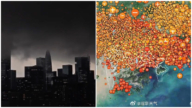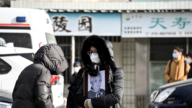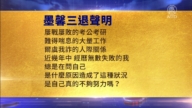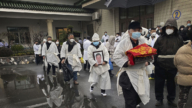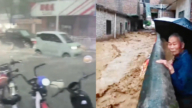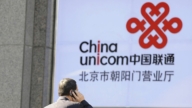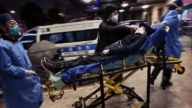【新唐人2013年10月29日讯】美国华人当中,有一位以英文写作并且获得世界推理小说大奖的作家裘小龙,至今已经出版了11本侦探悬疑小说,他的作品已经在多个国家被翻译成当地语文出版。但是令他苦恼的是,在他出生的国家——中国,他的作品常常遭遇出版商不可理喻的删减,而故事发生的地点——上海,也只能用H市来取代。
裘小龙是以英文创作的华裔小说家和诗人,毕业于“北京外国语大学”,曾经师从著名的翻译家卞之琳。裘小龙早年以翻译西方印象派诗歌而知名。
80年代末,裘小龙访美,90年代出版反映中国巨大变迁的惊悚侦探小说。2000年发表长篇英文推理小说《红英之死》,隔年荣获第三十二届世界推理小说大奖。他的作品已在法国、德国、意大利等国翻译出版。裘小龙目前居住在美国,在圣路易斯市“华盛顿大学”教授中国文学。
但是在自己的祖国出版自己的作品,裘小龙常常感到沮丧。裘小龙告诉《新唐人》,他的小说都是以他的故乡上海为背景,但是这些出版商却以H市来取代上海。
旅美小说家、诗人裘小龙:“他们觉得你这样写,好像对上海不是一件很光彩的事情。那么你说这个东西如果发生在一个子虚乌有的城市就没有关系,你要说发生在一个中国的城市,具体的那就不行。这是他们的逻辑,我觉得这是没有道理的。因为这小说本来就是虚构的事情。你说美国人写小说你说这个故事不能发生在纽约,没有这样的讲法。”
因为上海这两个字无法见光,裘小龙甚至决定拒绝在中国出版他的《双城案》。
裘小龙:“所谓《双城案》,我写的是在两个城市之间的一个故事,一个是我现在生活的圣路易市,在美国的,一个就是上海,那么如果出版商还是要像以前做的话,那我觉得整个书就not make sense,就很荒诞了,你说,这里是一个美国的真实的城市,另外一面,你又是一个虚构的城市,我觉得就不像话了。我宁可也不要出了。”
中国出版商对小说内容的删改大刀阔斧,理由却是掩饰黑暗面。比如,删除凶手被快速处决的情节,因为这样的“严打”,显得中国缺乏法律程序;比如,删除对老干部的负面描写,因为老干部的形象需要正面。
而最初从事诗歌创作的裘小龙,原来只是想写一本可以反映中国当代社会的小说。
裘小龙:“因为在这以前,我是写诗的,不是写小说的。所以我在写第一本小说的时候,在结构上碰到一些麻烦,比较凌乱,串不起来。然后我想着,我可以试着用侦探小说的办法,因为现在西方,尤其欧洲北欧那边,有一种侦探小说,他的写法就是很社会学的,他跟传统的侦探小说不一样,他更多的是讲,在什么样的社会背景下,能够这样做事?”
裘小龙抱着借鉴侦探小说的写法,把第一本书写完了,出版社因为喜欢这本书,还跟他签了三本书的合同,要求他按照同样的体裁,同样的主人翁写成系列小说。
裘小龙确实觉得,用写侦探小说的方法来写中国比较便利。因为作为一名探长或警察,可以到处去调查案子,可以探寻社会上的各种问题。他的每部小说,都侧重反映中国某个社会或政治层面的问题。
裘小龙:“你比如说,我有一本小说,叫《当红是黑的时候》,我就会特定去写‘文革’在当代中国留下的阴影和后果。我会特别注重这么一个层面。那么像我最近有一本写无锡太湖那个污染背景的,除了那个侦探小说之外,它就更写了中国污染的问题。所以每一本书我都有一定偏重。包括《双城案》,好几本,都讲到中国当代腐败的问题。”
裘小龙1988年前往美国做访问学者,隔年北京发生“六四”学生运动。裘小龙在美国参与声援,并且组织筹款募捐活动,当时《美国之音》对他进行了报导,他因此成为了中共当局眼中的敏感人物。裘小龙取消回国,留在美国攻读比较文学博士学位。
采访编辑/秦雪 后制/钟元
China Renames Shanghai as H City in Qiu Xiaolong’s Novels
Qiu Xiaolong, an award-winning English language writer
based in the U.S., who is known for his detective fiction.
He has published 11 novels, which have been translated
into many languages.
But what worries him is that in his homeland of China,
his novels are often reedited.
The plots of his novels are set in Shanghai,
but Chinese publishers replaced it with “H City".
Qiu Xiaolong, a Chinese novelist and poet in English
language, is a graduate of Beijing Foreign Studies University.
He was a student of well-known translator Bian Zhilin.
In his early years, Qiu became famous by translating
Western Impressionistic Poetry.
Qiu visited the U.S. in the late 80s.
He publishes detective novels set in China at the point when
it was making momentous changes in the 90s.
In 2000, he published his first book “Death of a Red Heroine"
which won the Anthony Award for Best First Novel.
His works have been translated and published in France,
Germany, Italy and other countries.
Qiu currently lives in the U.S. in St. Louis, Missouri,
where he teaches Chinese literature at Washington University.
But Qiu feels very frustrated about
the state of his publications in his home country of China.
Qiu told NTD that his novels
are set in his hometown Shanghai.
However, the publishers in China replaced “Shanghai"
with “H City" in his novels.
Qiu Xiaolong: “They feel my using Shanghai in the novel
in this way isn’t an honorable thing.
But they feel it’s fine if the story happened in this H City,
which even doesn’t exist.
They feel that it isn’t good if the novel clearly describes
the story as happening in a city in China.
This is their logic, which I think it is unreasonable.
Because it’s a fictional story, it’s unnecessary to change it.
If an American wrote a novel, who would tell them they can’t
have the story set in New York? This has never happened."
As “Shanghai" has been censored from his novels in China,
Qiu refuses to publish his novel “A Case of Two Cities" in China.
Qiu: “The story of ‘A Case of Two Cities’
takes place in two cities.
One is St. Louis, where I live now, and the other is Shanghai.
If the publisher still does the same as they did before,
I think the whole story wouldn’t make sense.
It’d be absurd.
One is a real city in the US, and one is a made up city.
I think it is outrageous.
I would rather not to have it published."
Chinese publishers re-edited Qiu’s novel
to cover up China’s actual dark secrets.
For example, they deleted some parts that
had a murderer killer quickly executed.
This kind of “crackdown" shows China’s lack of legal procedure.
They also deleted negative parts on veteran cadres,
as they only allow veteran cadres to be portrayed positively.
Qiu’s initial thought was to write a novel
to reflect China’s contemporary society.
Qiu: “Prior to this I wrote poems, not novels.
Thus when I wrote my first novel, I encountered some
difficulties in the composition.
It was piece by piece, I couldn’t put all together.
Then I thought to try the way of detective fiction.
Because in the Western, especially in North Europe,
there are types of crime-thriller novels that have a writing style
that’s very sociological, and written differently
from the traditional detective novels.
They focus on how things are done in such and such society."
Qiu drew from the detective novel style to finish his first book.
The publisher liked his book and signed a three book contract.
The publisher requested him to use the same style and the
same main character to write a series of novels.
Qiu says he feels detective fiction
is a convenient way to write about China.
Being an detective or a policeman,
he can go anywhere to investigate the case.
He can explore a variety of social issues.
Each of Qiu’s novels focus on social
or political problems in China.
Qiu: “For example, one of my books ‘When Red is Black’,
I specially write about the shadow of the Cultural Revolution
and its influence on modern China.
I can focus on this issue.
The latest story I am writing uses
the pollution of Wuxi’s Tai Lake as a setting.
Apart being a detective story,
it focuses more on China’s pollution problems.
Thus, in each book I have a focus issue,
including my book ‘A Case of Two Cities’.
Several of my books talk about China’s current corruption."
Qiu came to the US as a visiting scholar in 1988.
The next year, the Tiananmen Square Student Protest took place.
Qiu organized fundraising in the U.S. for Chinese students,
and when Voice of America reported on his efforts,
he became considered a sensitive figure by the Chinese regime.
Qiu canceled his return to China, and remained in the U.S.
to pursue a doctorate in comparative literature.


